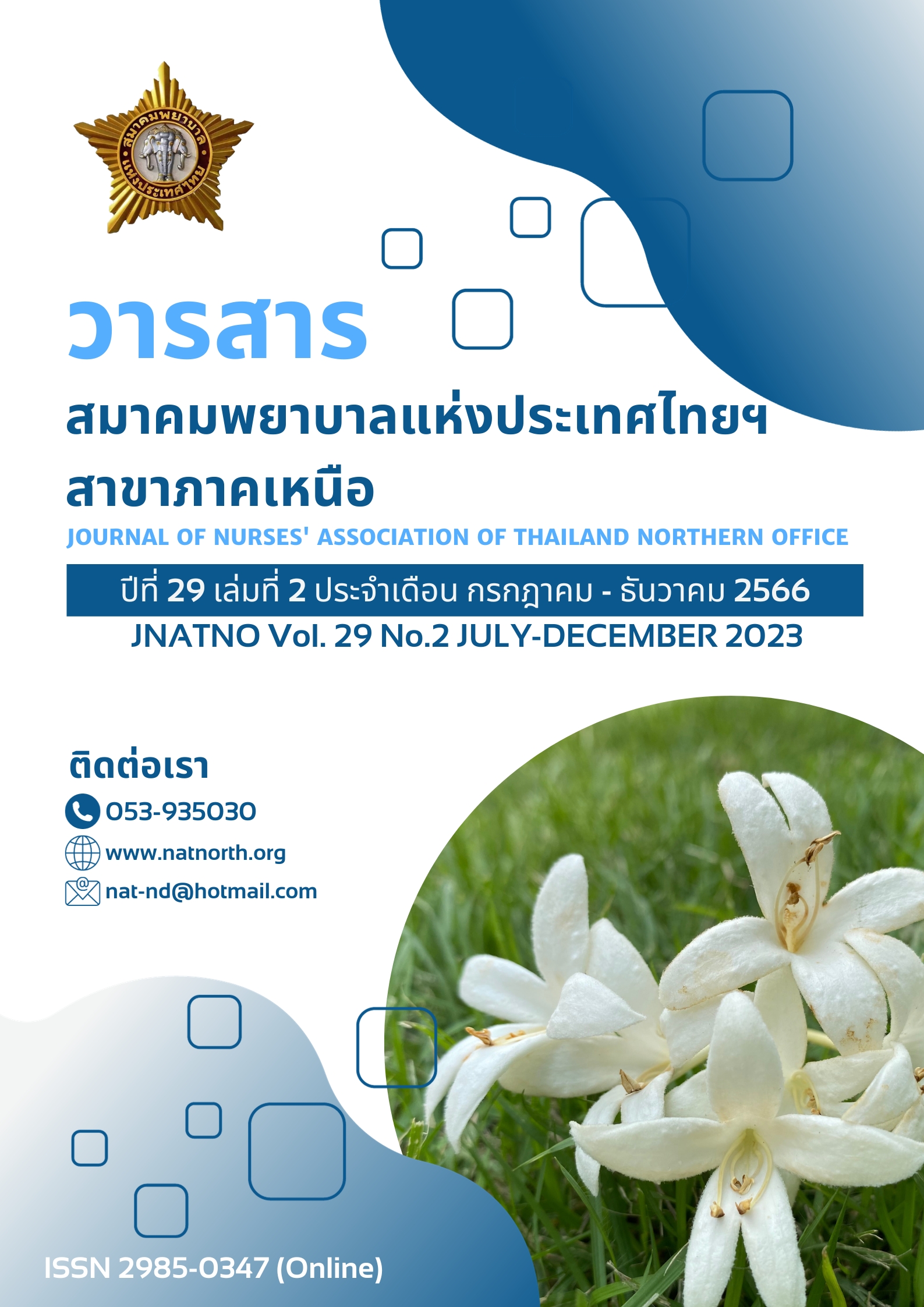แนวทางการลดพฤติกรรมความรุนแรงในการแก้ปัญหาของบุคคลวัยทำงานจากสถานการณ์การแพร่ระบาดของโรคโควิด-19
คำสำคัญ:
พฤติกรรมความรุนแรงในการแก้ไขปัญหา, บุคคลวัยทำงาน, สถานการณ์การแพร่ระบาดโรคโควิด-19บทคัดย่อ
สถานการณ์การแพร่ระบาดของโรคโควิด-19 ส่งผลกระทบที่สำคัญโดยตรงต่อบุคคลวัยทำงาน ที่เห็นชัดมากคือด้านฐานะทางเศรษฐกิจและสังคม เกิดการว่างงานจำนวนมากทำให้บุคคลวัยทำงานเกิดการเปลี่ยนแปลงทางอารมณ์โดยเฉพาะอารมณ์ด้านลบ ได้แก่ ความเครียด ความวิตกกังวล อารมณ์โกรธและความทุกข์ใจ และพบว่าบุคคลวัยทำงานที่ไม่สามารถจัดการกับปัญหาและอารมณ์ด้านลบที่เกิดขึ้นได้ ส่วนหนึ่งหาทางออกในการแก้ไขปัญหาโดยใช้ความรุนแรงและการทำร้ายตนเอง บทความนี้จึงมุ่งค้นหาแนวทางการลดพฤติกรรมความรุนแรงในการแก้ปัญหาของบุคคลวัยทำงาน โดยเน้นหลักการของความยืดหยุ่นทางจิตใจและการกำกับอารมณ์ เพื่อจะเป็นประโยชน์สำหรับพยาบาลชุมชนในการดูแลบุคคลวัยทำงานที่เสี่ยงต่อการเกิดพฤติกรรมความรุนแรงในการแก้ไขปัญหา เป็นการป้องกันปัญหาสุขภาพจิตและลดอันตรายจากพฤติกรรมความรุนแรงต่อไป
เอกสารอ้างอิง
มูลนิธิภิวัฒน์สาธารณสุขไทย. เผยผลสำรวจโควิด-19 ทำคนไทยตกงานกว่า5.8 ล้านคน น้ำท่วมซ้ำ หวั่นคนตกงานพุ่ง [ออนไลน์]. 2564 [เข้าถึงเมื่อ 2565/6/22]. เข้าถึงได้จาก: https://www.hfocus.org/content/2021/10/23264.
ศิริกร โพธิจักร. รักษาใจเด็ก ผู้ใหญ่วัยสูงอายุและอาชีพเสี่ยงป่วยยุคโควิดครองเมือง [ออนไลน์]. 2564 [เข้าถึงเมื่อ 2565/6/22]. เข้าถึงได้จาก: https://www.dmh.go.th/news/view.asp?id=2416.
สำนักงานคณะกรรมการสิทธิมนุษยชนแห่งชาติ. ปัญหาความรุนแรงครอบครัว-ภัยเงียบในวิกฤตโรคโควิด 19 วารสารมุมมองสิทธิ์ [ออนไลน์]. 2563 [เข้าถึงเมื่อ 2565/6/22]. เข้าถึงได้จาก: https://www.nhrc.or.th › getattachment › ปีที่-1.
Pedrosa AL, Bitencourt L, Fróes ACF, Cazumbá MLB, Campos RGB, de Brito SBCS, Silva ACS. Emotional, Behavioral, and Psychological Impact of the COVID-19 Pandemic [online]. 2020 [cited 2023/6/21]. Available from: doi: 10.3389/fpsyg.2020.566212.
Kawohl W, Nordt C. COVID-19, unemployment, and suicide. Lancet Psychiatry. 2020;7(5):389–90. doi:10.1016/S2215-0366(20)30141-3.
สำนักข่าวบีบีซีไทย. ฆ่าตัวตาย : ตัวเลขคนไทยปลิดชีพตัวเองไต่ระดับขึ้นระหว่างการระบาดของโควิด-19 [ออนไลน์]. 2564 [เข้าถึงเมื่อ 2565/7/20]. เข้าถึงได้จาก: https://www. bbc.com/thai/Thailand-57721370.
Lankarani BK, Hemyari C, Honarvar B, Khaksar E, Shaygani F, Haghighi RRM, Shaygan RM. Domestic violence and associated factors during COVID-19 epidemic: an online population-based study in Iran. 2022;22(774):1-22. doi.org/10.1186/s.12889-022-12536-y
กองทุนสนับสนุนการสร้างเสริมสุขภาพ. ทิศทางและเป้าหมาย ระยะ 10 ปี (พ.ศ.2565-2574) [ออนไลน์]. 2564 [เข้าถึงเมื่อ 2566/6/22]. เข้าถึงได้จาก: https://www.thaihealth.or.th.
Braun-Lewensohn O, Abu-Kaf S, Kalagy T. What factors explain anger and mental health during the COVID-19 pandemic? The case of Israeli society. World J Psychiatric. 2021;11(10):864-75.
อดิศร รักสกุล, อังคณา จิรโรจน์, และ เอกอุมา อิ้มคำ. ผลของโปรแกรมการกำกับอารมณ์ต่อพฤติกรรมรุนแรงของผู้ป่วยจิตเภทที่ติดสุราในชุมชน [ออนไลน์]. 2564 [เข้าถึงเมื่อ 2566/6/28]. เข้าถึงได้จาก: http://www.he01.tci-thaijo.org>article>download.
Wilkins N, Tsao B, Hertz M, Davis R, Klevens J. Connecting the Dots: An Overview of the Links Among Multiple Forms of Violence. Atlanta, GA: National Center for Injury Prevention and Control, Centers for Disease Control and Prevention; 2014.
รัฐวิชญ์ อริยพัชญ์พล, และพภัสสรณ์ วรภัทร์ถิระกุล. การแก้ปัญหาความรุนแรงในครอบครัวของไทย [ออนไลน์]. 2563 [เข้าถึงเมื่อ 2565/7/20]. เข้าถึงได้จาก: https://www.so04 tci- thaijo> article>Download.
ชุติมา มงคลบุตร. สถานการณ์ความรุนแรงในสถานที่ทํางาน และการจัดการความรุนแรงของบุคลากรในมหาวิทยาลัยในกํากับของรัฐแห่งหนึ่ง [วิทยานิพนธ์ปริญญาสาธารณสุขศาสตรมหาบัณฑิต]. กรุงเทพฯ:มหาวิทยาลัยธรรมศาสตร์; 2559.
Jolly C. Unit-4 Violence [online]. 2017 [cited 2023/6/21]. Available from: http://www.egyankosh.ac.in.
ชลาศัย กันมินทร์. ความรุนแรงในครอบครัว: ปัญหาและแนวทางป้องกัน [ออนไลน์]. 2562 [เข้าถึงเมื่อ 2565/6/22]. เข้าถึงได้จาก: https://www. Rsucon.rsu.ac.th>files>nation2019.
กรมสุขภาพจิต กระทรวงสาธารณสุข. เปลี่ยนร้ายกลายเป็นดี RQ พลังสุขภาพจิต. พิมพ์ครั้งที่ 4. กรุงเทพฯ: บริษัท บียอนด์พับลิสชิ่ง จำกัด; 2563.
สนธยา มณีรัตน์, แสงอรุณ อิสรมาลัย, และ อุมาพร บุณยโสพันธ์. โครงสร้างแนวคิดการฟื้นตัวของผู้สูงอายุไทย. วารสารสถาบันวิจัยพฤติกรรมศาสตร์. 2554;6(1):24-40.
McRae K, Gross JJ. Introduction to Emotion Regulation [online]. 2020 [cited 2023/6/25]. Available from: http://www. selfinjury.bctr.cornell.edu › resources.
Uusberg A, Taxer JL, Yih J, Uusberg H, Gross JJ. Reappraising reappraisal [online]. 2019 [cited 2023/6/25]. Available from: http://www.researchgate.net/publication/335292587_Reappraising_Reappraisal.
ดาวน์โหลด
เผยแพร่แล้ว
รูปแบบการอ้างอิง
ฉบับ
ประเภทบทความ
สัญญาอนุญาต
ลิขสิทธิ์ (c) 2023 สมาคมพยาบาลแห่งประเทศไทยฯ สาขาภาคเหนือ

อนุญาตภายใต้เงื่อนไข Creative Commons Attribution-NonCommercial-NoDerivatives 4.0 International License.
บทความที่ได้รับการตีพิมพ์เป็นลิขสิทธิ์ของสมาคมพยาบาลแห่งประเทศไทยฯ สาขาภาคเหนือ
เนื้อหาและข้อคิดเห็นใดๆ ที่ตีพิมพ์ในวารสารสมาคมพยาบาลฯ ถือเป็นความรับผิดชอบของผู้เขียนเท่านั้น ผู้เขียนบทความต้องศึกษารายละเอียดหลักเกณฑ์การจัดทำต้นฉบับตามที่วารสารกำหนด และเนื้อหาส่วนภาษาอังกฤษต้องได้รับการตรวจสอบจากเจ้าของภาษามาแล้ว


